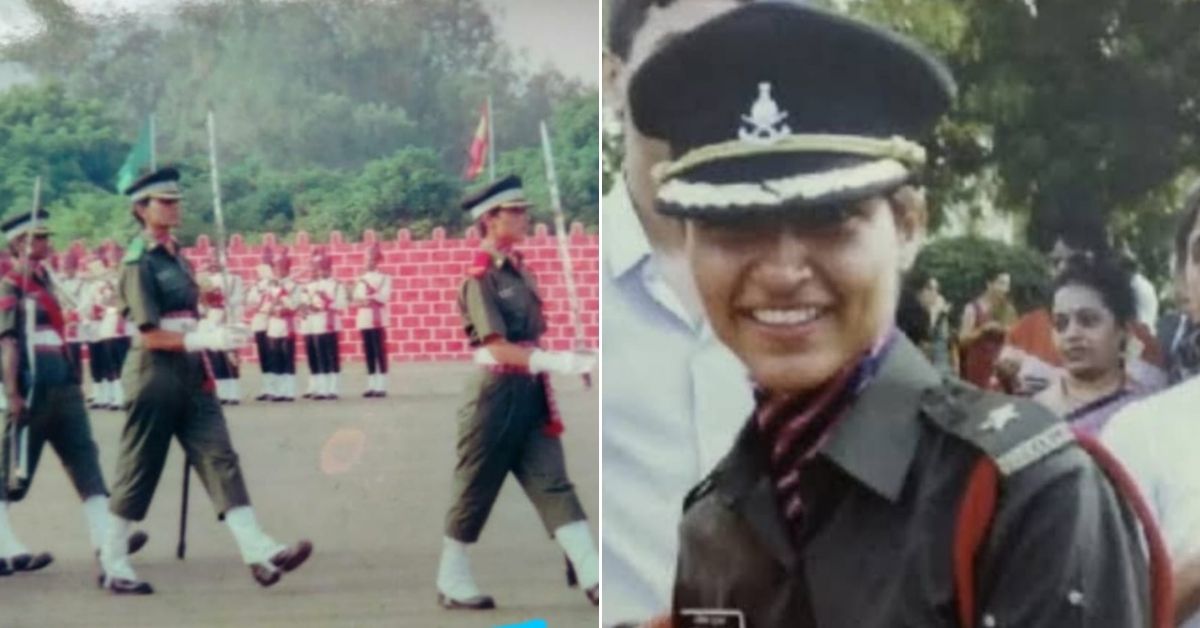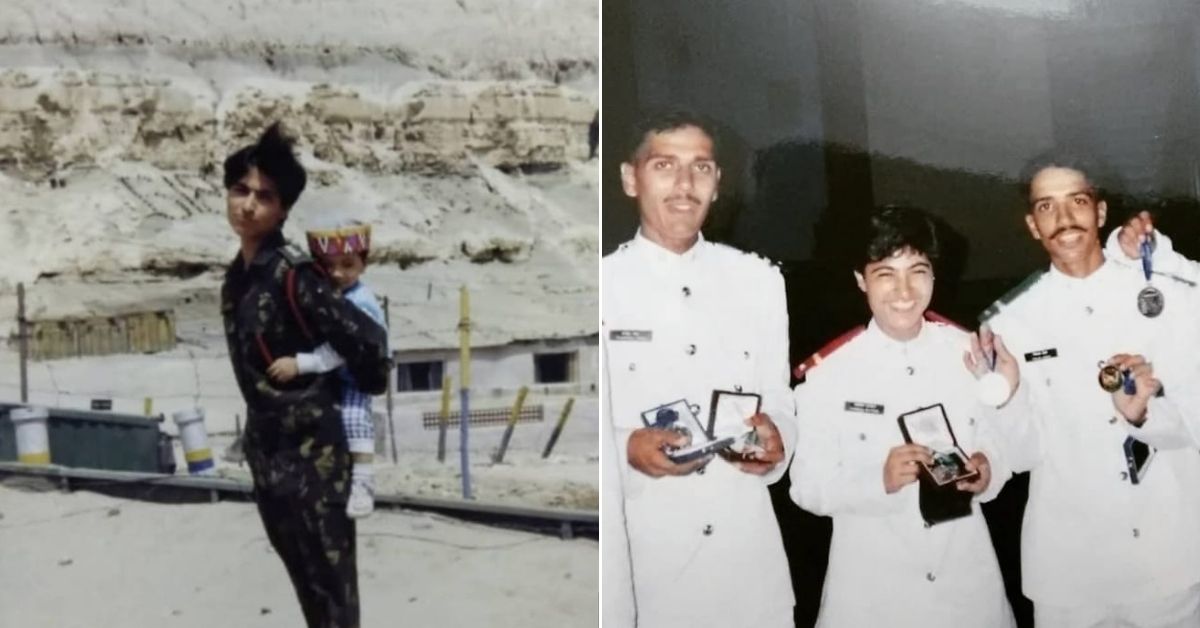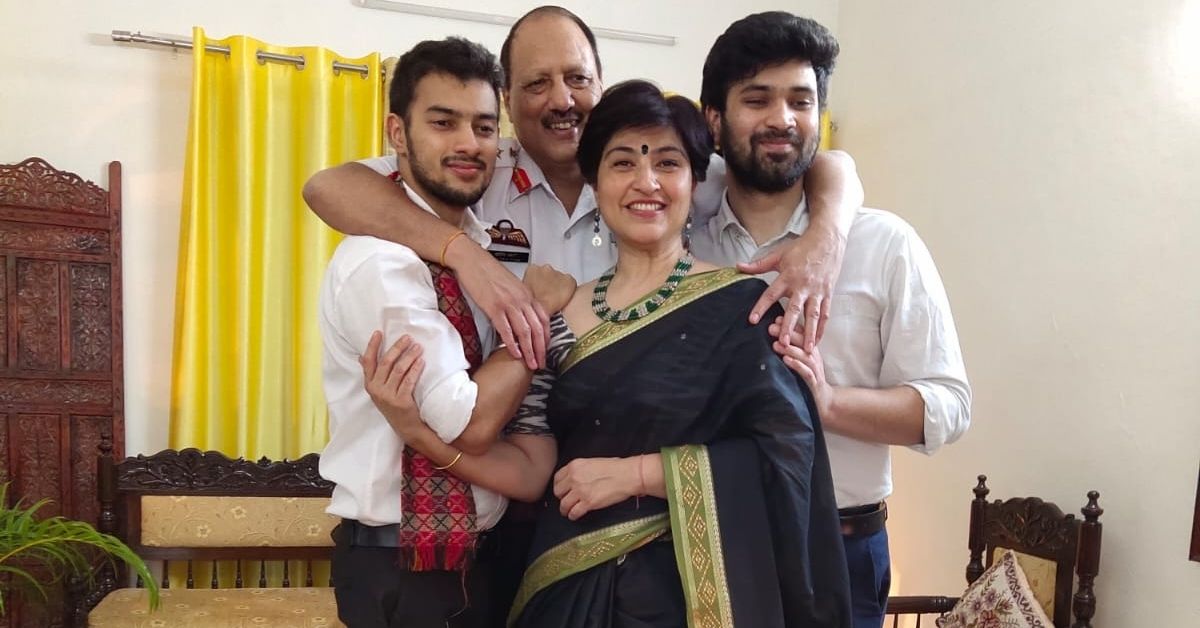“I lost my father when I was 7-years-old. My last memory of him was witnessing his mortal remains being brought back home in an army truck. I was too young to make a career choice back then but the army has always been like a family to me and a stable pillar in my life. So, I started dreaming of wearing that uniform and eventually decided to join the army,” says Capt. Yashika Hatwal Tyagi, 49-year-old Kargil war veteran.
Being brought up in a family of soldiers, it was a dream come true for Capt. Yashika when she donned the uniform for the first time in her life. She joined the Indian army in 1994 just a year after the Indian army started inducting women into its short service commission.
“Back then women were not allowed in the army. So, I aspired to become an IPS officer and worked towards my goal. But in 1993, in my final year of college, the army started inducting women into their short service commission and then there was no looking back. I completed my graduation and cracked Services Selection Board (SSB) exam and joined the army,” Capt. Yashika tells The Better India.
Entering The Army

Having lost her father at a young age, Capt. Yashika and her two sisters were brought up by her mother who was just 33 years old when she lost her husband. “My mother completed her education after my father’s death and became a teacher to support us. Our childhood wasn’t easy, it was all about cutting corners and wearing or reading hand-me-down clothes and books. But there was a lot of love between us. We three women grew to be strong ladies, supporting each other. My mother always encouraged us to be independent and supported our dreams,” she says with pride.
Capt. Yashika met the love of her life Sanjeev Hatwal much before she joined the army. Hatwal, now a Colonel, was in the army when he married her in 1995 after being in love for several years. She says, “He has been a huge support system in my life and was always proud of me and encouraged me to join the army. Having been brought up without a male figure in my life and then meeting a person like him made me feel lucky.”
A year after her marriage, in 1996, she gave birth to her first son Kanhav and often had to leave her child at home because of work. She says. “A working mother would relate to the emotions I had to deal with back then. It’s a dilemma when you have to leave your child for work, at the same time you cannot compromise on your job, especially in the army, it is impossible to be late even by a minute.”
She adds, “So, I found a middle ground, I started waking him up early to spend time with him. Then I would feed, bathe and play with him before reporting for duty. It wasn’t enough but I still managed to be with my kid.”
Crossing Unchartered Territories

A year later, in 1997, Capt. Yashika became the first female officer in the Indian army to be posted in the extremely cold climate region of Leh. “The high altitude and the oxygen levels felt difficult in the beginning but my body got adjusted to it gradually. As an ordnance officer, my role and responsibility area was quite huge as the logistics requirements of the army ranged from a needle to huge missiles. Everything that keeps the army functional was the responsibility of my team. There were people around me observing my work and judging my capability as I was a woman. It was quite challenging but I did my best,” she explains her experience.
Later in 1999, when Capt. Yashika was called to serve in the Kargil war, she was pregnant with her second son. But being pregnant, she says, was never an excuse to not participate in the historic war.
“There was no question of saying that I was pregnant or expecting any kind of special treatment. I also took my son with me and he was kept in an office away from our base and taken care of. I had to work round the clock, keep all the soldiers equipped with the required ammunition during the war. Luckily by then, my body was well adjusted to high altitudes and there were no other complications in pregnancy.”
Speaking about her experience at war, Capt. Yashika mentions her meeting with late Captain Vikram Batra. She recollects her candid conversation with him, “I told Capt. Batra that I wish women officers were also allowed to fight in the war. To this, he replied that I was a true inspiration for him as I was part of the war while pregnant. He said that without me he wouldn’t be equipped to fight.”
She adds, “It wasn’t easy, there were times when it was difficult to breathe properly due to low oxygen levels and I used to get scared for my unborn child. Also, at that time my husband was deployed in Drass and was fighting the war. When Kanhav asked about his father, I had no answer and told him we are fighting a war and we are going to win.”
After India won the Kargil war, Capt. Yashika was reunited with her husband. She received two medals including the Operation Vijay Star medal and became the first lady officer to receive a battle report. Later in 2001, she hung up her army boots.
“I had to make this decision since it was a short service commission and I also wanted to give priority to my family. But had it been a permanent service commission back then, my choice would have been different,” she adds.
Asked about the decision of the Indian Army to extend permanent commission to women, Capt. Yashika says, “I am very happy that after almost 30 years, they are now allowing women to serve permanently. I am glad that now women in uniform will take it as a very serious career choice and also everyone would take them seriously.”

Capt. Yashika is now a motivational speaker and a corporate leadership multiplier and her husband, Colonel Sanjeev Hatwal is still serving in the army. Her son, Kanhav is a budding entrepreneur and Dhruv is studying law, aspiring to join the Judge Advocate General dept. in the Indian army.
As for advice to the ambitious young generation of girls, she says, “Never feel that you can or cannot do something because you are a girl. People should know you by your capabilities and not because you have been given certain responsibilities because you are a girl. Every girl should think that I can do it because I am a capable human being.”
She adds, “I am glad that my story has inspired women to believe that they are not lesser than men. And they can be just as capable as men to serve the country.”
Strap: Meet Captain Yashika Tyagi, a short service commissioned lady officer from the Indian Army and a Kargil war veteran, who took part in the war while she was pregnant and became the first lady officer to receive a battle report.
(Edited by Yoshita Rao)
No comments:
Post a Comment